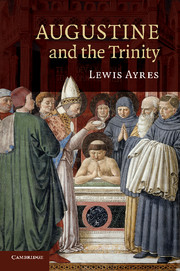Book contents
- Frontmatter
- Contents
- Acknowledgements
- List of abbreviations
- Introduction
- Part I Origins
- 1 Giving wings to Nicaea
- 2 From Him, through Him and in Him
- 3 Faith of our fathers:
- Part II Ascent
- Part III Into the mystery
- Part IV Memory, intellect and will
- Epilogue: Catching all three
- Bibliography
- Scripture index
- General index
- References
1 - Giving wings to Nicaea
Published online by Cambridge University Press: 06 December 2010
- Frontmatter
- Contents
- Acknowledgements
- List of abbreviations
- Introduction
- Part I Origins
- 1 Giving wings to Nicaea
- 2 From Him, through Him and in Him
- 3 Faith of our fathers:
- Part II Ascent
- Part III Into the mystery
- Part IV Memory, intellect and will
- Epilogue: Catching all three
- Bibliography
- Scripture index
- General index
- References
Summary
‘the perception of incorporeal things quite overwhelmed me and the Platonic theory of ideas added wings to my soul …’
ON BEING AND NOT BEING A ‘PLATONIST’
There is a long-standing charge that Augustine's Trinitarian theology differed from that of his predecessors and was not a truly Trinitarian theology because it began as an adaptation of Plotinus's or Porphyry's accounts of the three primary realities or hypostases.2 In this chapter and the next I will refute this charge and consider how we can better envisage the multiple influences on Augustine's earliest Trinitarian writing. The last clause of the previous sentence intentionally limits the scope of my investigation. We should not assume that Platonism had an influence of the same character on all aspects of Augustine's theology.3 The influence that non-Christian Platonist texts had on his understanding of dialectic as a philosophical tool will not necessarily have been the same as the influence of those texts on his earliest understanding of the Trinity. Thus my concern is not with ‘the influence of Platonism on Augustine’, but with the specific influence of Platonism on Augustine's early Trinitarian theology.
It is important, however, to begin by locating the specific arguments of this chapter within the broader context of modern scholarly debate about Augustine's ‘Platonism’. While that scholarship has been divided over the possible identification of his early Neoplatonic readings as Plotinian or Porphyrian (and over the role of Christians already influenced by such texts), it has been virtually unanimous in rejecting the idea, popularized by Prosper Alfaric in the first half of the twentieth century, that Augustine converted to Platonism before he converted to Christianity.
- Type
- Chapter
- Information
- Augustine and the Trinity , pp. 13 - 41Publisher: Cambridge University PressPrint publication year: 2010



